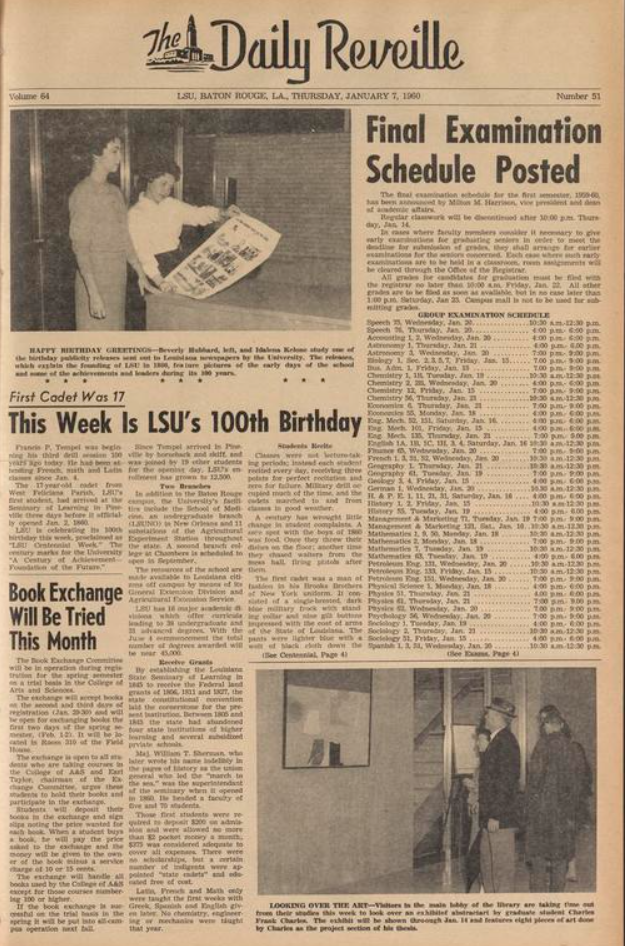Since its establishment in 1887, the Reveille, formerly known as The Daily Reveille, has served as the eyes and ears of Louisiana State University. 2020 was no exception. After the end of a historic year, here’s a look back on all the major moments in University history from the perspective of its campus newspaper.
September 1906 – First class of women admitted into LSU, Law School opens
While a transfer student named Olivia Davis became the first female LSU graduate in 1905, the University did not officially offer admissions to a group of female students in the freshman class until the next year.
An article from Sept. 27, 1906, reported that 15 women joined the Department of Philosophy and Education, bringing the University’s total enrollment to 429.
“The session of 1906-07 has opened under the most favorable conditions, and with the brightest prospects for the future,” the article read.
The first LSU Law class was also inaugurated that year with 20 full-time students. Classes were also open to undergraduates interested in legal studies. The school’s impressive library contained the entire National Reporters’ System as well as the Lawyer’s Reports Annotated.
“The students, realizing that they are now beginning to lay the foundation for their chosen profession and being inspired by the enthusiasm shown by their instructors, are earnestly and persistently endeavoring to plain their standard on the same plane with the other departments of this University,” the Reveille wrote about the Law School’s inaugural class.
November 1924 – First game at Tiger Stadium
LSU’s first game at Tiger Stadium was played in fall of 1924. An audience of over 20,000 fans gathered to watch the Bengals smother the Green Wave 20-0. Before the construction of Tiger Stadium, the LSU football team played at State Field, located on the old LSU campus in downtown Baton Rouge.
While it may be hard to imagine LSU’s stadium without its current moniker, the venue was nameless upon its debut. A column appearing in the Nov. 26, 1924 edition of the Reveille argued that an official name would be appropriate: “We are leaving an athletic field with thousands of traditions, one that brings memories of wonderful victories, of sad defeats, and of great contests,” the column read. “We must build new ones through the years at the new place, a bigger and better field that the growth of the school has long demanded, and it would seem that the best way to start is to secure a name for it.”
LSU’s rivalry against Tulane ran deep throughout the 1920s, with University fans going as far as to steal Tulane’s goat mascot. Read more about past LSU traditions.
April 1926 – Campus Dedication
Construction on the University’s current campus began in 1921, the new campus was not officially dedicated until 1926, after games were already being played regularly in the new stadium.
A 1924 Reveille article entitled, “Partial Completion on New Site Marks Growth,” describes the new campus as “one of the greatest investments the state has ever made in better trained men and women.”
According to the article, the new campus cost an estimated $8,000,000 and accommodated 5,000 students. Budget constraints later prompted a redesign for a 1,500 student capacity. . The space constraints prompted LSU to adapt standardized building guidelines in the 1990s.
First Black Undergraduate Student Admitted
Alexander “A.P.” Tureaud Jr. became the first Black undergraduate student admitted to LSU in 1953.
The Reveille chronicled Tureaud’s lengthy court proceedings when his father, Alexander Tureaud Sr., sued the state of Louisiana so his son could attend the University. The 17-year-old New Orleans native was registered in the Junior Division and roomed in the military barracks, alone in a three-man room, according to a Reveille article from Sept. 17, 1953.
Tureaud’s enrollment only lasted 55 days before his case ended in a mistrial. Six decades later, Tureaud’s name appeared in The Reveille again as he recounted the cruel, racist behavior of fellow students and the administration.
“It was probably one of the worst experiences I had ever been through,” Tureaud said in an article from February 2016. “I was totally isolated and nobody spoke to me.”
Fall 1958 – LSU Wins First Football National Championship
No one expected much from LSU’s football team in 1958, the year after a 5-5 season that was barely salvaged by a victory over Tulane. But Coach Paul Dietzel and future Heisman winning halfback Billy Cannon led the Tigers to a perfect 11-0 season capped off with a 7-0 National Championship victory over Clemson.
Although LSU didn’t officially win the championship game until the Sugar Bowl game was played on Jan. 1, 1959, a Dec. 4, 1958 edition of The Reveille proclaimed LSU the national champions after the team topped both press association rankings.
“And in compiling an unbeaten, untied record for 10 consecutive games, Coach Dietzel and the Tigers have achieved what every LSU coach and team for the past 50 years has dreamed,” the article read. “Nineteen Hundred and Fifty Eight has truly been “next year” for every loyal LSU fan, from Morgan City to Minden, South Africa to Tokyo.”
The article went on to say, “The honor of being National Champions will always be remembered and talked about for many years to come by this year’s Tigers. And it is something that we too will also share in and recall in the nightly card games and bull sessions whenever football is mentioned. And so, the Daily Reveille would like to add its voice to the many plaudits that have been and will be given to Coach Dietzel and the Fabulous Tigers of 1958 and submit a sincere vote of thanks and appreciation for a job well done.”
In the years after The Reveille used its voice to bring tribute to the unforgettable 1958 football team, it has also had the honor of recounting three additional National Championship victories: 2007, 2011 and 2019.
It has also followed up on some of the less celebratory moments in LSU history, such as Tureaud’s recollections of his time as the University’s first Black undergraduate student, the pain brought to many of the University’s female students as a result of Title IX misconduct and the Athletic Department’s failure to hold their award-winning athletes accountable.
In its 133 years of existence, The Reveille has fallen short when covering sensitive issues. But it is through the eyes of The Reveille that readers can commemorate the victories, reflect on the failures and examine the evolution of campus life through the perspective of the students who lived it.







